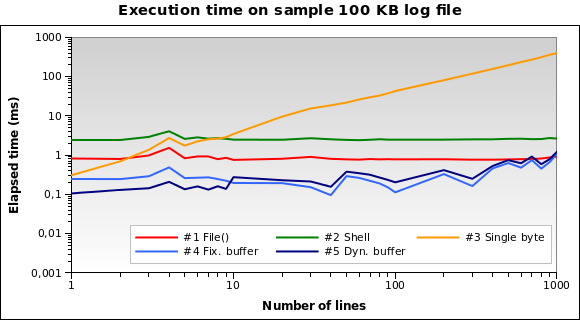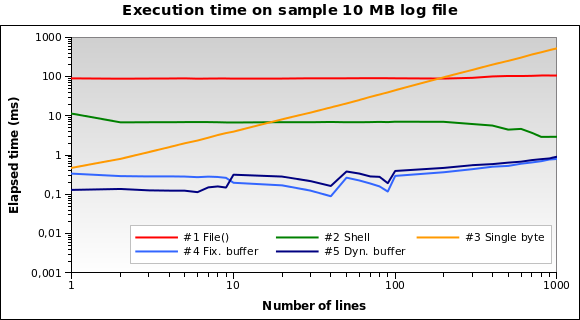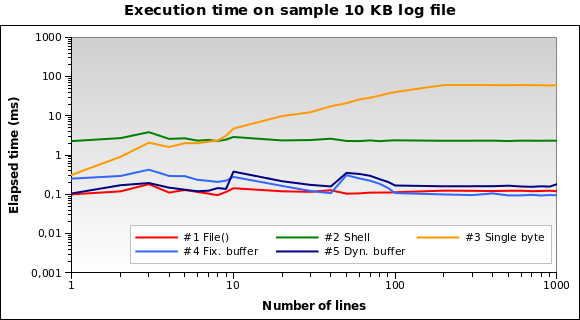How to read only 5 last line of the text file in PHP?
Untested code, but should work:
$file = file("filename.txt");
for ($i = max(0, count($file)-6); $i < count($file); $i++) {
echo $file[$i] . "\n";
}
Calling max will handle the file being less than 6 lines.
Read last line from file
This should work:
$line = '';
$f = fopen('data.txt', 'r');
$cursor = -1;
fseek($f, $cursor, SEEK_END);
$char = fgetc($f);
/**
* Trim trailing newline chars of the file
*/
while ($char === "\n" || $char === "\r") {
fseek($f, $cursor--, SEEK_END);
$char = fgetc($f);
}
/**
* Read until the start of file or first newline char
*/
while ($char !== false && $char !== "\n" && $char !== "\r") {
/**
* Prepend the new char
*/
$line = $char . $line;
fseek($f, $cursor--, SEEK_END);
$char = fgetc($f);
}
fclose($f);
echo $line;
Note that this solution will repeat the last character of the line unless your file ends in a newline. If your file does not end in a newline, you can change both instances of $cursor-- to --$cursor.
What is the best way to read last lines (i.e. tail ) from a file using PHP?
Methods overview
Searching on the internet, I came across different solutions. I can group them
in three approaches:
- naive ones that use
file()PHP function; - cheating ones that runs
tailcommand on the system; - mighty ones that happily jump around an opened file using
fseek().
I ended up choosing (or writing) five solutions, a naive one, a cheating one
and three mighty ones.
- The most concise naive solution,
using built-in array functions. - The only possible solution based on
tailcommand, which has
a little big problem: it does not run iftailis not available, i.e. on
non-Unix (Windows) or on restricted environments that don't allow system
functions. - The solution in which single bytes are read from the end of file searching
for (and counting) new-line characters, found here. - The multi-byte buffered solution optimized for large files, found
here. - A slightly modified version of solution #4 in which buffer length is
dynamic, decided according to the number of lines to retrieve.
All solutions work. In the sense that they return the expected result from
any file and for any number of lines we ask for (except for solution #1, that can
break PHP memory limits in case of large files, returning nothing). But which one
is better?
Performance tests
To answer the question I run tests. That's how these thing are done, isn't it?
I prepared a sample 100 KB file joining together different files found in
my /var/log directory. Then I wrote a PHP script that uses each one of the
five solutions to retrieve 1, 2, .., 10, 20, ... 100, 200, ..., 1000 lines
from the end of the file. Each single test is repeated ten times (that's
something like 5 × 28 × 10 = 1400 tests), measuring average elapsed
time in microseconds.
I run the script on my local development machine (Xubuntu 12.04,
PHP 5.3.10, 2.70 GHz dual core CPU, 2 GB RAM) using the PHP command line
interpreter. Here are the results:

Solution #1 and #2 seem to be the worse ones. Solution #3 is good only when we need to
read a few lines. Solutions #4 and #5 seem to be the best ones.
Note how dynamic buffer size can optimize the algorithm: execution time is a little
smaller for few lines, because of the reduced buffer.
Let's try with a bigger file. What if we have to read a 10 MB log file?

Now solution #1 is by far the worse one: in fact, loading the whole 10 MB file
into memory is not a great idea. I run the tests also on 1MB and 100MB file,
and it's practically the same situation.
And for tiny log files? That's the graph for a 10 KB file:

Solution #1 is the best one now! Loading a 10 KB into memory isn't a big deal
for PHP. Also #4 and #5 performs good. However this is an edge case: a 10 KB log
means something like 150/200 lines...
You can download all my test files, sources and results
here.
Final thoughts
Solution #5 is heavily recommended for the general use case: works great
with every file size and performs particularly good when reading a few lines.
Avoid solution #1 if you
should read files bigger than 10 KB.
Solution #2
and #3
aren't the best ones for each test I run: #2 never runs in less than
2ms, and #3 is heavily influenced by the number of
lines you ask (works quite good only with 1 or 2 lines).
PHP - Returning the last line in a file?
The simplest naive solution is simply:
$file = "/path/to/file";
$data = file($file);
$line = $data[count($data)-1];
Though, this WILL load the whole file into memory. Possibly a problem (or not). A better solution is this:
$file = escapeshellarg($file); // for the security concious (should be everyone!)
$line = `tail -n 1 $file`;
PHP Grab last 15 lines in txt file
Try using array_slice, which will return a part of an array. In this case you want it to return the last 15 lines of the array, so:
$filearray = file("filename");
$lastfifteenlines = array_slice($filearray,-15);
PHP: Retrieving lines from the end of a large text file
If you are on a 'nix machine, you should be able to use shell escaping and the tool 'tail'.
It's been a while, but something like this:
$lastLines = `tail -n 500`;
notice the use of tick marks, which executes the string in BASH or similar and returns the results.
PHP: Read from certain point in file
This uses fseek to read 100 lines of a file starting from a specified offset. If the offset is greater than the number of lines in the log, the first 100 lines are read.
In your application, you could pass the current offset through the query string for prev and next and base the next offset on that. You could also store and pass the current file position for more efficiency.
<?php
$GLOBALS["interval"] = 100;
read_log();
function read_log()
{
$fp = fopen("log", "r");
$offset = determine_offset();
$interval = $GLOBALS["interval"];
if (seek_to_offset($fp, $offset) != -1)
{
show_next_button($offset, $interval);
}
$lines = array();
for ($ii = 0; $ii < $interval; $ii++)
{
$lines[] = trim(fgets($fp));
}
echo "<pre>";
print_r(array_reverse($lines));
}
// Get the offset from the query string or default to the interval
function determine_offset()
{
$interval = $GLOBALS["interval"];
if (isset($_GET["offset"]))
{
return intval($_GET["offset"]) + $interval;
}
return $interval;
}
function show_next_button($offset, $interval)
{
$next_offset = $offset + $interval;
echo "<a href=\"?offset=" . $offset . "\">Next</a>";
}
// Seek to the end of the file, then seek backward $offset lines
function seek_to_offset($fp, $offset)
{
fseek($fp, 0, SEEK_END);
for ($ii = 0; $ii < $offset; $ii++)
{
if (seek_to_previous_line($fp) == -1)
{
rewind($fp);
return -1;
}
}
}
// Seek backward by char until line break
function seek_to_previous_line($fp)
{
fseek($fp, -2, SEEK_CUR);
while (fgetc($fp) != "\n")
{
if (fseek($fp, -2, SEEK_CUR) == -1)
{
return -1;
}
}
}
Related Topics
Regex Pattern to Get the Youtube Video Id from Any Youtube Url
The Advantage/Disadvantage Between Global Variables and Function Parameters in PHP
Using PHP to Populate a <Select></Select> Dropdown
PHP Technique to Query the Apns Feedback Server
How to Read a List of Files from a Folder Using PHP
How to Remember Input Data in the Forms Even After Refresh Page
Extending the Controller Class in Codeigniter
How to Read Only 5 Last Line of the Text File in PHP
Posting JSON Objects to Symfony 2
How to Run the PHP Code Asynchronous
PHP Emitting 500 on Errors - Where Is This Documented
Post Content-Length Exceeds the Limit